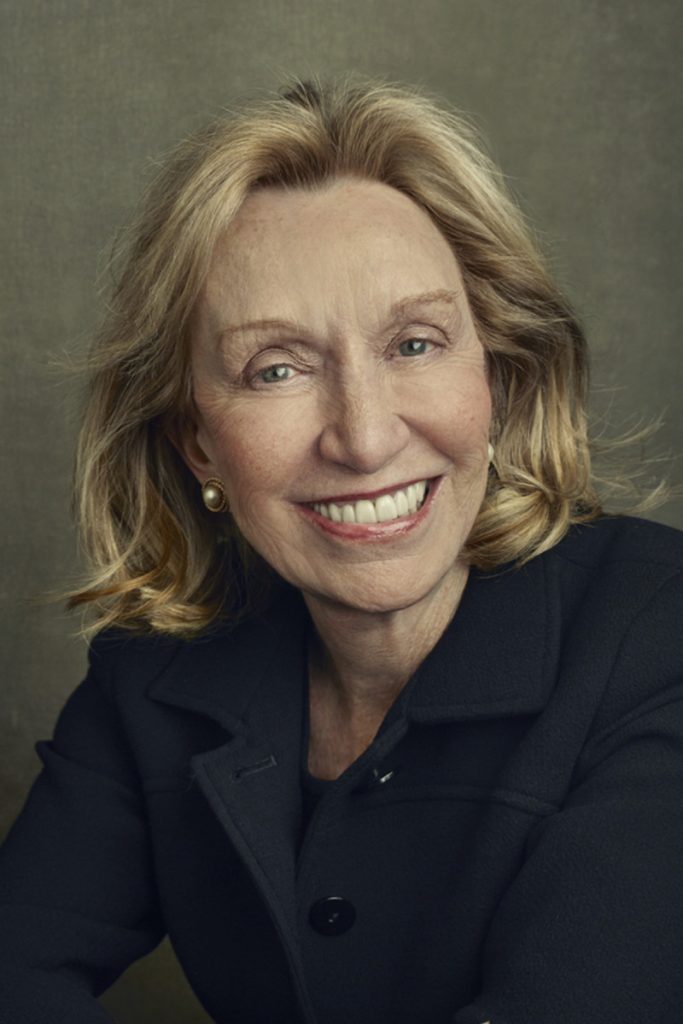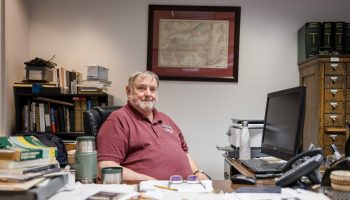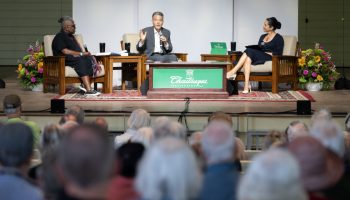
Susie Anderson
Staff Writer
Pulitzer Prize winner Doris Kearns Goodwin will open the final week of the 2025 Chautauqua Lecture Series at 10:45 a.m. today in the Amphitheater. With five decades of scholarship studying presidents Abraham Lincoln, Theodore Roosevelt, Franklin Roosevelt and Lyndon Johnson, Goodwin returns for Chautauqua Week Nine’s theme “Past Informs Present: How to Harness History.” She’ll be interviewed on stage by lifelong Chautauquan, member of the board of trustees, and former managing editor of TIME Magazine, Nancy Gibbs.
In 1995, Goodwin was awarded the Pulitzer Prize in history for No Ordinary Time: Franklin and Eleanor Roosevelt: The Home Front in World War II. Her 2006 book Team of Rivals: The Political Genius of Abraham Lincoln was awarded the Lincoln Prize and served as a partial basis for Steven Spielberg’s lauded 2012 film “Lincoln.” With an illustrious career of research into American presidents, Goodwin turned a historical lens to her husband in her most recent book, An Unfinished Love Story: A Personal History of the 1960s. This book traces the life of her late husband and presidential speechwriter Richard Goodwin.
In an appearance on PBS’ “Firing Line with Margaret Hoover” in May 2024, Goodwin shared that she would call the presidents that she studied “my guys.” Writing about her husband, Richard Goodwin — a longtime speech writer and presidential adviser to John F. Kennedy and Lyndon Johnson — introduced a new angle to her approach.
“But now this was my guy, right across the room from me. He could correct me; I could ask him ‘Why did he write this?’ ” Goodwin said.
The couple sifted through over 300 boxes of memorabilia from the 1960s onward, reflecting on their time working in close connection to Presidents Kennedy and Johnson. What initially emerged as a project to relive Richard’s memory turned into a book project after his death in 2018.
The two Goodwins met in 1972 when he walked into her office at Harvard.
“So began a conversation about LBJ, the Sixties, writing, literature, philosophy, science, astronomy, sex, evolution, gossip, the Red Sox and everything else under the sun,” Kearns writes in An Unfinished Love Story.
Goodwin told PBS that she does not think it is possible to write clear-eyed historical narratives. Whether writing about her husband or American presidents, she is selective with her subjects.
“I have to have a basic respect for them and an affection,” Goodwin said. “They’re going to disappoint you. Everyone has flaws, as indeed my husband did as well, but as long as I have a basic respect and liking for them, then I feel like I’ll give them a fair shake.”
Goodwin brings her subjects to life by highlighting strengths without shying away from their weaknesses. Her interest in presidents began at 24-years-old when she served as a White House Fellow for Lyndon Johnson in his last year. Goodwin had worried that her outspoken opposition to his policies would revoke her position as a fellow.
“I’d written an article against him, which came out several days after I was selected as a White House Fellow,” Goodwin said to PBS. “It was given the title by The New Republic, ‘How to Remove Lyndon Johnson in 1968,’ and I thought he was going to kick me out.”
Johnson did not, and instead the experience heavily informed Goodwin’s first book, Lyndon Johnson and the American Dream. Her critically acclaimed and New York Times bestseller Leadership in Turbulent Times inspired the young adult version The Leadership Journey: How Four Kids Became President and the History Channel’s miniseries events “Abraham Lincoln,” “Theodore Roosevelt” and “FDR,” which — through her production company, Pastimes Productions — Goodwin executive produced.
In a week looking to the past to inform the future, Goodwin’s experience as a leading historian on times of American tumult will bring Chautauquans into a week of exploration into the past and present. In a time of division, Goodwin holds out hope.
“In most of the other times that we’ve been in great trouble, somehow America still came through with strength because the people responded and the leaders responded,” Goodwin said to PBS. “So we’re still writing the chapter of where we are right now, and I still have hope that somehow that chapter will end up better than in the 1850s, leading to the Civil War.”




